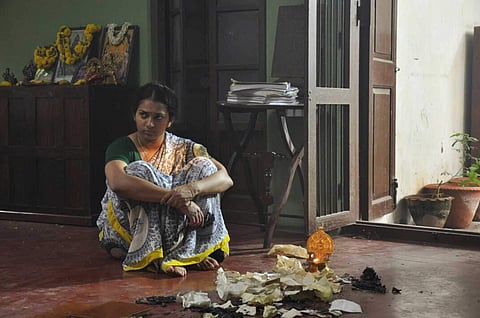

When you’re in a different city for several days, watching films from across the world, you yearn for a taste of something familiar, something that would keep the homesickness at bay. I got my fix in the form of director Vasanth’s Sivaranjiniyum Innum Sila Pengalum that played on Monday. The film’s coming five years after his last release, Moondru Per Moondru Kaadhal, and rather intriguingly, the same idea of a triptych is followed in this film too, which is made up of three shorts about the plight of three respective women — Saraswathi, Devaki, and Sivaranjini. All three belong to families that aren’t affluent, with Saraswathi’s languishing in poverty. Quite interestingly, Vasanth doesn’t bite into the upper class and its methods of suppression in any of the three films.
There’s more than a hint that the way to emancipation for women is through awareness, through education. Devaki is the overt rebel. She’s got a respectable job, she goes around riding a bike. She’s likely well-read too, given that she shows a natural interest in writing a diary, in registering her progressive thoughts on paper, which include her admiration for women wearing jeans. It’s this sort of exposure that Sivaranjini’s mother-in-law seems to be worried about, when she sees a lot of fiction lying around the house. She calls it ‘kuppai’, and asks how Sivaranjini’s husband — her son — ‘allows’ her to read it. This love for literature could well be a reference to the director’s own love for books that he spoke about after the screening of the film. “Given a chance, I’d simply just keep reading. But I can’t afford to; so I also make films,” he joked.
Sivaranjiniyum Sila Pengalum is also striking in its seeming lack of urgency. It’s the nature of short stories though, especially those which aim to introduce you to the finer details of other people’s lives. The purpose of Vasanth’s film is to have you acknowledge — even if not empathise with — the unspeakable monotony and drudgery patriarchy inflicts on its women. Saraswathi (brilliantly played by Kalieaswari Srinivasan) is a trembling, vulnerable creature, who’s got to run her modest home, while being careful not to irk her easily angered husband. Sivaranjini is a woman who’s forgotten to dream; they have all been smothered by the endless, thankless chores of being a wife and a mother. Devaki is a working wife who realises to much shock and humiliation that privacy is a property afforded only to a man. These are tragedies around us, tragedies we don’t always recognise.
I’ll remember Vasanth’s film, especially for one terrifically choreographed, breathless scene that shows the draining mornings of Sivaranjini’s life. It’s a stretch that begins with her waking up and ends with the husband and daughter leaving home. It’s a stretch that got the audience breaking into applause, as Sivaranjini finally slouches on the furniture, taking the breaths she couldn’t afford till then. For ears that are used to applause for heroes who spit punchlines, it was glorious relief to hear ovation for a woman — not just any woman, but one who does dishes, irons clothes, makes food, raises children, cleans house, tolerates entitled men, and often, does all of these at once.